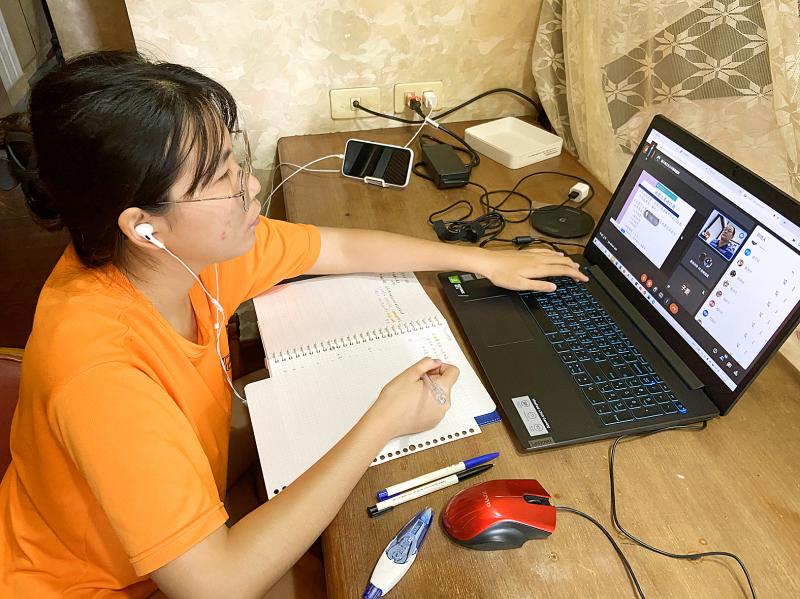Acer Inc (宏碁) and Asustek Computer Inc (華碩) last week reported strong sales for last month thanks to demand for notebook computers spurred by teleworking and distance learning amid the COVID-19 pandemic.
The companies’ operations have continued to improve since last year, as the pandemic has resulted in lifestyle changes, with remote and video communication becoming essential and prompting companies to speed up digital transformation, while PCs have become an indispensable tool in people’s daily lives.
Acer’s consolidated sales reached NT$24.81 billion (US$897.9 million), up 22.9 percent year-on-year, but down 0.6 percent month-on-month, the company said in a statement on Wednesday, adding that last month’s figure was the highest for the period in seven years.

Photo: CNA
The company attributed the annual increase to Chromebooks for distance learning, whose sales increased 30.1 percent year-on-year, and gaming products for home-bound consumers, which posted an annual sales increase of 15.3 percent.
For the first five months of this year, sales totaled NT$121.31 billion, up 36.6 percent from a year earlier, Acer said.
As orders for PCs have continued to exceed its supply, Acer said it would work closely with supply chains, as component supply remains a key factor to its shipments this year.
Asustek’s sales increased 40.36 percent year-on-year and 5.7 percent month-on-month to NT$38.58 billion last month, the highest May sales figure in the company’s history, it reported on Wednesday.
Cumulative sales in the first five months reached NT$183.19 billion, up 66.16 percent from a year earlier and also the highest for the same period, it said.
The companies’ sales were also boosted by a nationwide level 3 COVID-19 alert announced on May 19, which has led to strong pandemic-related demand, especially for notebook computers and Chromebooks, Yuanta Securities Investment Consulting Co (元大投顧) analyst Calvin Wei (魏建發) wrote in a note on Thursday.
“Asustek and Acer are the major beneficiaries of the strong work-from-home demand, given Asustek’s higher sales exposure to notebook computer business versus its peers, and Acer’s sales contribution of 10-15 percent comes from the domestic market,” Wei wrote.
Micro-Star International Co (MSI, 微星科技) also posted record-high sales of NT$15.67 billion for last month, up 43.2 percent year-on-year and 4 percent month-on-month, the company said in a regulatory filing on Wednesday.
MSI’s sales in the first five months grew 57.3 percent year-on-year to NT$78.76 billion, it said.
“With more than 60 percent sales contribution from gaming products, MSI has been the major beneficiary of the gaming uptrend,” Wei said.
However, the company has benefited mildly from the COVID-19 outbreak in Taiwan, given its sales exposure of only 2 to 3 percent to the domestic market, he said.

To many, Tatu City on the outskirts of Nairobi looks like a success. The first city entirely built by a private company to be operational in east Africa, with about 25,000 people living and working there, it accounts for about two-thirds of all foreign investment in Kenya. Its low-tax status has attracted more than 100 businesses including Heineken, coffee brand Dormans, and the biggest call-center and cold-chain transport firms in the region. However, to some local politicians, Tatu City has looked more like a target for extortion. A parade of governors have demanded land worth millions of dollars in exchange

Hong Kong authorities ramped up sales of the local dollar as the greenback’s slide threatened the foreign-exchange peg. The Hong Kong Monetary Authority (HKMA) sold a record HK$60.5 billion (US$7.8 billion) of the city’s currency, according to an alert sent on its Bloomberg page yesterday in Asia, after it tested the upper end of its trading band. That added to the HK$56.1 billion of sales versus the greenback since Friday. The rapid intervention signals efforts from the city’s authorities to limit the local currency’s moves within its HK$7.75 to HK$7.85 per US dollar trading band. Heavy sales of the local dollar by

Taiwan Semiconductor Manufacturing Co’s (TSMC, 台積電) revenue jumped 48 percent last month, underscoring how electronics firms scrambled to acquire essential components before global tariffs took effect. The main chipmaker for Apple Inc and Nvidia Corp reported monthly sales of NT$349.6 billion (US$11.6 billion). That compares with the average analysts’ estimate for a 38 percent rise in second-quarter revenue. US President Donald Trump’s trade war is prompting economists to retool GDP forecasts worldwide, casting doubt over the outlook for everything from iPhone demand to computing and datacenter construction. However, TSMC — a barometer for global tech spending given its central role in the

An Indonesian animated movie is smashing regional box office records and could be set for wider success as it prepares to open beyond the Southeast Asian archipelago’s silver screens. Jumbo — a film based on the adventures of main character, Don, a large orphaned Indonesian boy facing bullying at school — last month became the highest-grossing Southeast Asian animated film, raking in more than US$8 million. Released at the end of March to coincide with the Eid holidays after the Islamic fasting month of Ramadan, the movie has hit 8 million ticket sales, the third-highest in Indonesian cinema history, Film